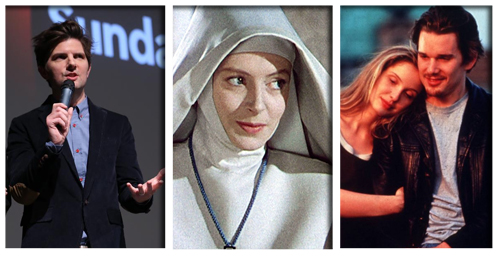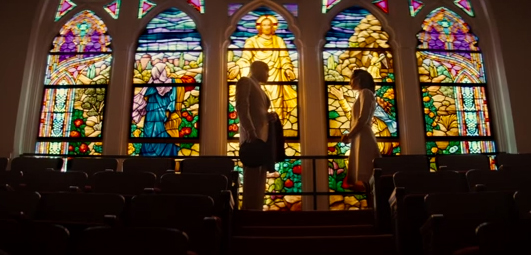What Link Gets Wrong About Blog
 Thursday, January 29, 2015 at 1:00PM
Thursday, January 29, 2015 at 1:00PM AV Club deep screen capture to reveal how well constructed shots in Divergent dont make for a good film
BuzzFeed great essay on the current relevancy of Before Sunrise (1995) and instant nostalgia
Heat Vision Tyrese Gibson obsessed with playing Green Lantern in a film that's at least 5 years away based on a character already ruined by the movies
Decider 10 essential movies about nuns from our beloved Black Narcissus to less impressive but famous offerings like Doubt

HuffPo Adam Scott and Jason Schwarzmann discuss their prosthetic penises in The Overnight. (Takeaway: no actor will ever truly be naked again onscreen. That's only for actresses)
THR talks to the director of Book of Life - though disappointed by the lack of an Oscar nomination, he cherishes stories from fans about how it effected their families
Towleroad arts teacher in Texas does "Uptown Funk" with students. Cute. But I only share it because I love Uptown Funk because you know why (first verse)
Playlist Paul Thomas Anderson loves Edge of Tomorrow and The Grand Budapest Hotel
THR Why Me and Earl and the Dying Girl did not choose the highest bidder at Sundance
This Week's Must Read
You undoubtedly know already that Mark Harris is one of the best writers on movie culture and the awards beat in general (if for some insane reason you haven't read his first book Pictures at a Revolution, it's the most invaluable Oscar book since "Inside Oscar") but I think his latest column for Grantland is one of his all time finest. He goes deep on "How Selma Got Smeared: Historical Fiction And Its Malcontents" I only wish this essay had broken sooner before Oscar nomination voting. Now you may be thinking 'please, Nathaniel, I have read enoug about Selma's LBJ problem' and you may even be thinking (as I have been) that complaints about Selma's "Oscar snub" are starting to feel weirder and weirder as the season progresses. Fact: Selma will now go down in movie history as a Best Picture nominee, something only 8 movies from hundreds and hundreds released in 2014 can claim. But trust me you need to read this anyway.

Here's a part I particularly love (bold is mine) that is really illuminating about historical fiction:
About a third of the way into Selma, Coretta Scott King (Carmen Ejogo) has a private meeting with Malcolm X (Nigel Thatch) in an Alabama church (this is not an invention of the movie; the two met in Selma on February 5, 1965, two weeks before Malcolm X was assassinated). The scene is introduced with a shrewd recurring device — an onscreen teletype legend that tells moviegoers what’s happening, but only through the warping prism of FBI surveillance. “C. King in Selma to meet with Negro militant Malcolm X. 03:46 p.m. LOGGED.” The description denotes the assumption of white law enforcement that a conspiracy of one kind is taking place — a clandestine meeting in which King may be moving closer to throwing in with a more militant, potentially violent faction of the movement. In reality, the “conspiracy” that’s unfolding is exactly the opposite; Malcolm tells the wary Coretta that he is not in Selma to impede her husband’s work, but to allow himself to be used, even to be misrepresented, to further King’s goals.
...
DuVernay’s view of the uses of history and of (mis)representation is not careless in this scene or in the movie; it’s clearly thought through. The onscreen typed summary is a perfectly deployed example of how something can be factually correct (meeting with a “Negro militant” is, literally, what Coretta King is doing) without being true; the movie, by contrast, finds many ways of being true without being strictly factual. That is exactly what good historical drama must sometimes do, and must be given permission to do, including in this scene itself, in which DuVernay has a character express an understanding that his presence and his motives may have to be slightly distorted in order to achieve a greater truth and justice.
And Harris illuminates it, strategically, in a scene not even involving LBJ.


